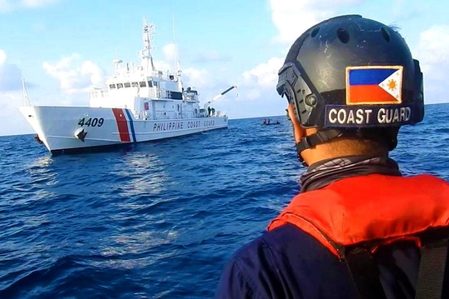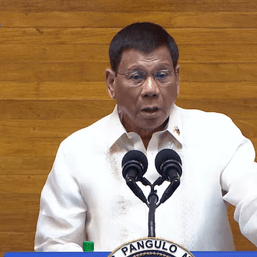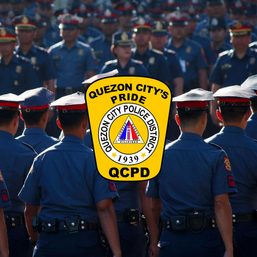SUMMARY
This is AI generated summarization, which may have errors. For context, always refer to the full article.
![[OPINION] Duterte’s last SONA only magnifies his reactionary foreign policy](https://www.rappler.com/tachyon/2021/08/TL-dooterte-foreign-policy-1280.jpg)
President Rodrigo Duterte’s rambled speech at his final State of the Nation Address merely revealed how unsophisticated — yet precarious — Philippine foreign policy is under his watch. As the “chief architect of our country’s foreign policy,” the current Philippine head of state magnified how narrow-minded, dependent, and reactionary his external relations agenda has truly been for over half a decade. In fact, Duterte’s concluding SONA report last July 26 was an exercise in highlighting what the next Philippine president should avoid and reject in terms of Manila’s global affairs direction beyond June 30, 2022.
Indeed, the Philippine leader managed to show before the Filipino people, and to the world at large, the substandard but true state of Philippine foreign policy throughout his waning term in office. In this regard, Duterte’s foreign relations framework is only predicated upon preserving what remains of a deteriorating external environment, while reacting to international pressures — chiefly from competing imperialist powers — without any strategic world outlook at all.
At the very least, there is no attempt by Manila to even slightly alter its immediate neighborhood — Southeast Asia’s regional balance — in a manner that would benefit the future of the region’s vast populace of oppressed working class masses. And undoubtedly, this is due to the Duterte regime’s capitalist character, which is largely fixated on accumulating and protecting short-term economic gains and profits to maintain sectarian political interests along factional lines.
Within this context, the regime aims to extend its hold over state power via next year’s general elections — and by employing state terrorism whenever it serves Malacañang’s interests. As such, the elitist nature of the Philippine State’s ruling political faction will always be willing and ready to sacrifice the country’s principles in the arena of foreign affairs. This includes disregarding the pursuit of “an independent foreign policy,” together with the “consideration of national sovereignty, territorial integrity, national interest, and the right to self-determination.”
Likewise, in foregoing democratic values — which must guide Philippine foreign policy — the Duterte regime continues to ignore and violate the promotion of “social justice in all phases of national development,” and the “full respect for human rights.”
Thus, the sum of these dynamics influences the basic approach to Malacañang’s capitalist-imperialist-fascist thrusts in the pursuit of foreign relations.
Nonetheless, certain major elements stood out in Duterte’s foreign policy testimonial during his SONA. First of all, even if it took him almost three hours to deliver his national address, the president could have still presented a brief, coherent presentation to explain his key foreign policy decisions and accomplishments from the past five years. Instead of incoherence, Duterte could have clearly stated the general premise and direction of his external relations agenda within the context of an internationally situated, strategically designed, and well-articulated foreign policy framework. What was missing was the assertion of a grand strategic narrative outlining central foreign policy objectives for the Philippines to attain in today’s fast-changing global order.
Secondly, from a democratic standpoint, one of Duterte’s foreign policy boasts endangers the country’s decades-long pro-democracy/human rights standing on the world stage. In relation to the Association of Southeast Asian Nations, the chief of state of the ASEAN’s proudest democratic member country boasted of having the support of governments belonging to this regional club of dictators. But of course, this is unsurprising because many of Duterte’s ASEAN counterparts — who are also rightwing autocrats and fascists — are supportive of each other’s policies of state repression.
Since no ASEAN leader speaks out against Duterte’s state terrorism, Manila will not stand up against Burma’s and/or Thailand’s military dictatorships — to say the least. As a result, the Philippine president’s arrogant admission can only reinforce the ASEAN’s behavior toward a deepening of the region’s anti-democratic character. Southeast Asia’s masses must continue to resist such an escalating authoritarianism across the region — and even beyond.
Thirdly, Duterte’s principal attitude toward the two rival imperialist powers — the United States of America and the People’s Republic of China — is the same. While he openly rants against American imperialism, the Duterte regime also upholds the 1951 RP-US Mutual Defense Treaty (MDT), 1999 RP-US Visiting Forces Agreement (VFA), 2002 RP-US Mutual Logistics Support Agreement (MLSA), and 2014 PH-US Enhanced Defense Cooperation Agreement (EDCA). Moreover, through the latter joint-defense instrument, Malacañang allows US troops to operate from across five Philippine military bases nationwide.
Yet, Duterte continues to remain silent on all of these military bases inhabited by US forces. This is especially the case regarding the MDT — the “mother treaty” that legally permits American troops to operate on, and to occupy Philippine territory. If Duterte is seriously against America’s historical interventions in the Philippines, then he must immediately scrap all of the aforementioned defense agreements/treaties — and then swiftly expel all US troops from Philippine soil.
Conversely, concerning Chinese social imperialist power, Duterte makes no qualms about his close and friendly relations with Beijing — he patently expressed this at his own SONA.
Right now, the Philippines manifests that Chinese naval forces are sailing within its declared Western maritime zone while, simultaneously, US military forces are occupying terrestrial spaces in Luzon, Visayas, and Mindanao. So, in effect, the Republic of the Philippines has already become a major Southeast Asian conflict space, with the stationing of military units belonging to the world’s top contending imperialist powers. In the meantime, however, Malacañang’s greater attention is focused on a matrix of suspected small-time drug-dealers operating in local barangays.
And fourth, Philippine foreign policy’s present direction has maintained the same course and heading since July 4, 1946 — mendicant, subservient, and reactionary. This was basically reaffirmed by Duterte’s SONA. Sadly, not much has changed in 75 years.
Therefore, many keen Filipinos are already asking themselves if the Philippines will still remain along this same outward path post-Duterte. Or could there yet be an independently proactive foreign policy for the country? With only nine months to go before the May 9, 2022 presidential elections, the gravity and scope of Philippine foreign policy has risen to become a major topic of national discourse. And in a positive way, its enormity and grave impact on the country are beginning to be understood and appreciated by many young Filipinos of voting age.
Now that Duterte’s terminal year is ending, prospects for a new Philippine president looms on the horizon for most. The possibilities for pursuing a cooperative, internationalist, non-aligned, and genuinely independent foreign policy track is being posed before the electorate. Fortunately, the socialist political center, Laban ng Masa, is advancing this alternative for 2022. And definitely, this policy agenda for the country’s future must be acutely and crucially thought out, too — not just by the national candidates, but more so by all Filipinos. – Rappler.com
Rasti Delizo is an international affairs analyst and an activist in the socialist movement.
Voices features opinions from readers of all backgrounds, persuasions, and ages; analyses from advocacy leaders and subject matter experts; and reflections and editorials from Rappler staff.
You may submit pieces for review to opinion@rappler.com.
Add a comment
How does this make you feel?











![[WATCH] Bamban POGO scandal: There’s a bigger fish than Alice Guo](https://www.rappler.com/tachyon/2024/07/inside-track-tcard-bamban-pogo.jpg?resize=257%2C257&crop=435px%2C0px%2C1080px%2C1080px)
![[Vantage Point] China’s silent invasion of the Philippines](https://www.rappler.com/tachyon/2024/07/TL-china-silent-invasion-july-16-2024.jpg?resize=257%2C257&crop=318px%2C0px%2C720px%2C720px)





![[OPINION] Glitter vs Gold: What happened on SONA day](https://www.rappler.com/tachyon/2021/07/glitter-vs-gold-sq.jpg?resize=257%2C257&crop_strategy=attention)

![[VIDEO EDITORIAL] Sining at pagpupumiglas: Bakit namamayagpag ang ‘Tumindig’ ngayong SONA?](https://www.rappler.com/tachyon/2021/07/animated-duterte-sona-2021-no-year.gif?resize=257%2C257&crop_strategy=attention)
There are no comments yet. Add your comment to start the conversation.